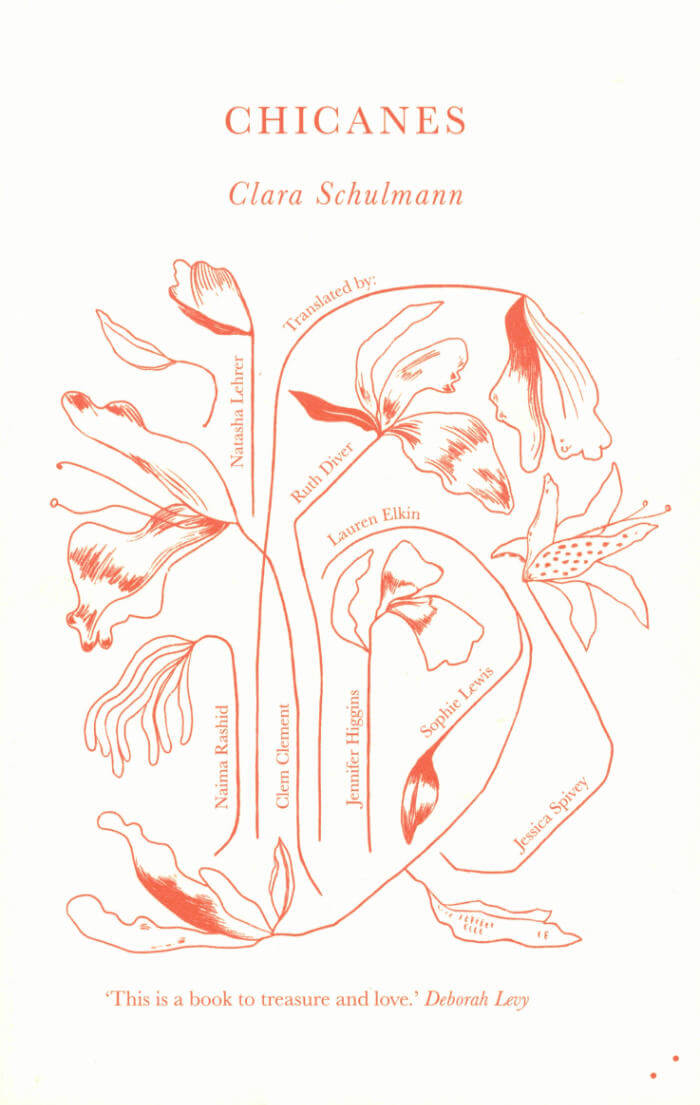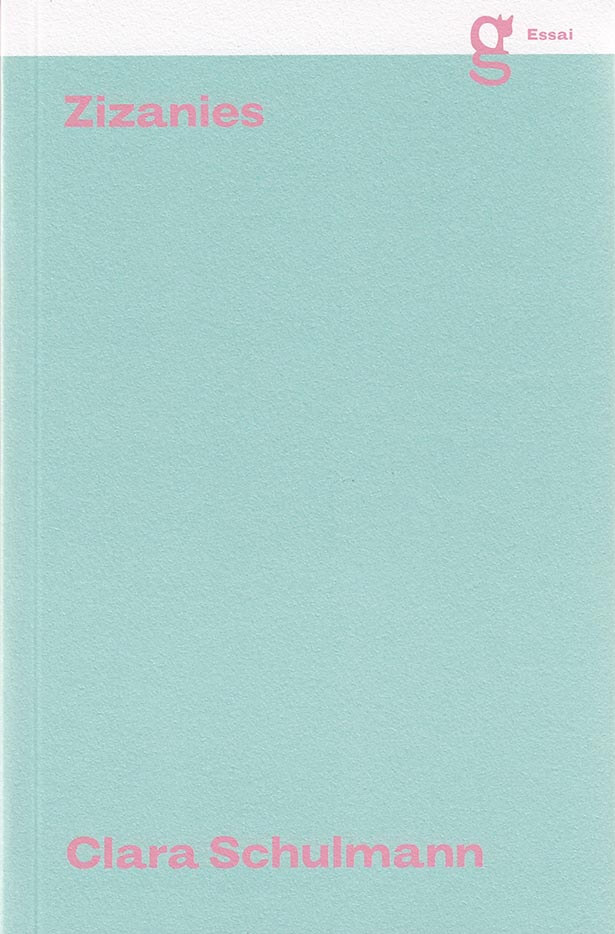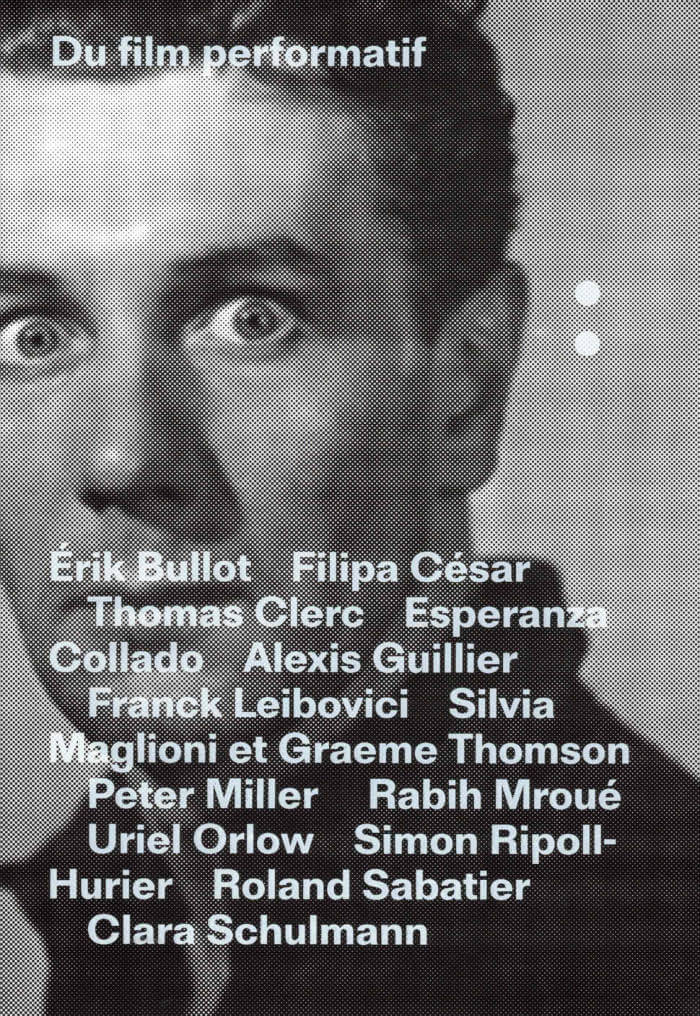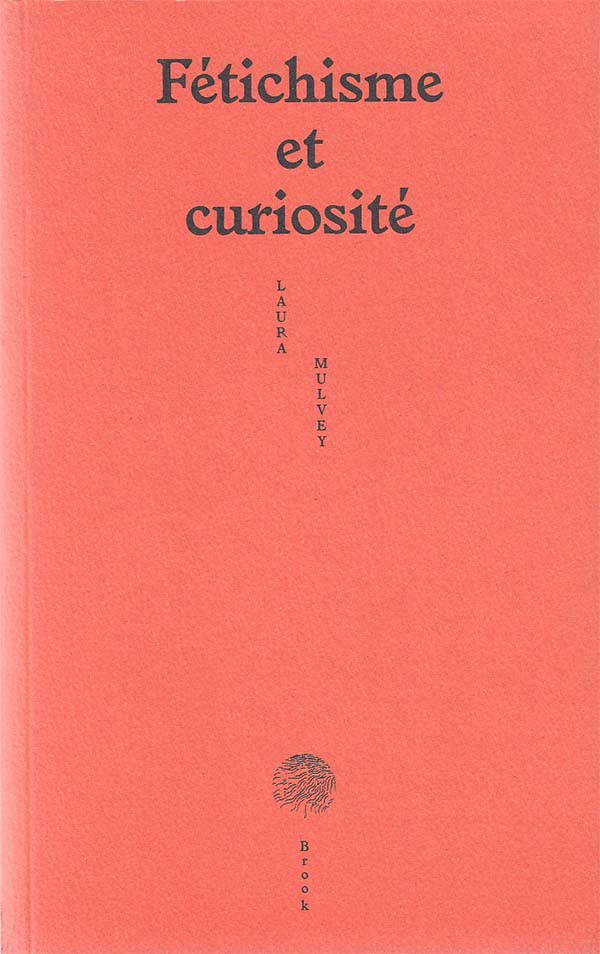Clara Schulmann
Clara Schulmann

Chicanes
Translated from the French by Naima Rashid, Natasha Lehrer, Lauren Elkin, Ruth Diver, Jessica Spivey, Jennifer Higgins, Clem Clement and Sophie Lewis.
As she tries to collect them for an essay she is planning to write, other women’s words begin interfering in Clara Schulmann’s life — heard on the radio, in podcasts, songs, and films; words of novelists, feminist intellectuals, friends or strangers overheard in the street. They invade her psyche, reshaping the essay that she once had in mind into a picaresque adventure which investigates the fault lines around women’s voices: and in particular those moments of overflow and excess where wayward words take seed.
Chicanes heralds a new French feminism through a meticulously orchestrated chorus of the wildest female voices, from figures in the history of feminist writing to the stranger on the street, blurring the boundaries between body and art; personal and political. A poly-translation, by eight female translators, from established to emerging, Chicanes brings the individual voice of each translator into subtle relief.

Zizanies
As she tries to collect them for an essay that she is wanting to write, voices begin interfering in Clara’s Schulmann life. Voices of women, heard on the radio, in podcasts, songs, and films; voices of novelists or feminist theorists; voices of friends or of strangers overheard in the street. Like weeds, like bad seeds (what « zizanies » stands for in French), these wayward words invade her thoughts and her life, and the essay that she once had in mind unfolds in a picaresque tale full of twists and turns. Zizanies is a timely and elegant narrative that reveals Clara Schulmann as a new author whose own voice is going to matter in the years to come. (The texts in this book are French only.)
And more

Fidback, Revue de cinéma n° 01
Le numéro 1 de la revue de cinéma Fidback éditée par le FIDMarseille, avec un retour sur la 35e édition du festival, un regard rétrospectif sur des films qui ont fait l'actualité mondiale du cinéma en 2024, une carte blanche à Clara Schulmann, et un portrait de l'artiste et cinéaste Declan Clarke par Alice Leroy.
Retour sur six films issus de la sélection officielle du FID, par des auteurs, critiques et écrivains de langues française et étrangères. Les textes critiques sont accompagnés d'entretiens, de documents ou de matériaux inédits. De Amsevrid, premier film magistral du cinéaste algérien Tahar Kessi, jusqu'au Tríptico de Mondongo du maestro argentin Mariano Llinás, ce bouquet de films est un condensé de l'édition 2024 du festival – une poignée de films parmi tous ceux qui auraient mérité le retour.
Le choix des huit films sur lesquels nous avons invité des auteurs et autrices à poser leur regard est en soi un geste critique. Il nous a semblé que les derniers films d'Albert Serra, Miguel Gomes, Alain Guiraudie, Jia Zhangke et Victor Iriarte méritaient plus que d'autres l'inscription dans le temps long de la revue. Films restaurés, écrits édités, rétrospective et exposition au Jeu de Paume : Chantal Akerman fut pour beaucoup, cette année, une révélation. Naked Acts, le film ressuscité de Bridgett Davis, aura marqué ceux qui ont eu la chance de le voir.
Pour sa carte blanche, Clara Schulmann a choisi le film Lucciole (2021), de Pauline Curnier Jardin. Mais son texte porte au-delà de l'œuvre, il déplace le geste critique en un récit spéculatif sur la manière dont une vie et un travail se tissent sur une trame faite de lieux, d'histoires, de personnes.
Alice Leroy est la première à faire le portrait de l'artiste et cinéaste irlandais et berlinois Declan Clarke : à prendre la mesure, à tracer les perspectives d'une œuvre majeure, bien qu'encore méconnue, du cinéma d'aujourd'hui.
Fidback est une revue de cinéma éditée par le FIDMarseille. Chaque année, elle dessine une image-constellation du cinéma aimé et défendu par le festival.

Du film performatif
Mapping the practices of performative cinema today.
Texts by Érik Bullot, Filipa César, Esperanza Collado, Thomas Clerc, Alexis Guillier, Franck Leibovici, Silvia Maglioni & Graeme Thomson, Peter Miller, Rabih Mroué, Uriel Orlow, Simon Ripoll-Hurier, Roland Sabatier, Clara Schulmann.

F.R. David - "Erratum"
Following an open call, this is—the very last issue—a collectively-compiled "Erratum", or addendum [if you will] to the twenty-three issues from 2007 until now.
Edited with Paul Abbott, After 8, Alma Sarif, Phil Baber, Daniel Blumberg, Thomas Boutoux, Kristien Van den Brande, Chloe Chignell, Martina Copley, Anthony Elms, Chris Evans, Carolina Festa, Kasper Feyrer, Richard Finlay Fletcher, Ben Green, Mariëtte Groot, Krist Gruijthuijsen, Léa Guillon, Sarah Handley, Gloria Hasnay, Loes Jacobs, Michel Khleifi, Willis Kingery, gerlach en koop, James Goggin, Keira Greene, Léa Guillon, Jacob Lindgren, Kobe Matthijs, Martino Morandi, Zen Nguyen, Alice Notley, Robert M. Ochshorn, Oscar the dog, Willem Oorebeek, David Reinfurt, Scott Rogers, Andrés de Santiago Areizaga, Rosa Sarholz, Clara Schulmann, Andrea di Serego Alighieri, Sabrina Tarasoff, Kristy Trinier, Seymour Wright and Unknown.
F.R.DAVID is a typographical journal, dealing with the organization of reading and writing in contemporary art practices. It was published by de Appel in Amsterdam (2007–2016) and is currently co-published by KW with uh books.

Fétichisme et curiosité
French edition of Laura Mulvey's writings which range from analyses of Xala, Citizen Kane and Blue Velvet, to an extended engagement with the creations of Native American artist Jimmie Durham and the feminist photographer Cindy Sherman. Essays explore the concept of fetishism as developed by Marx and Freud, and how it relates to the ways in which artistic texts work.
Translated from the English by Guillaume Mélère.
Preface by Clara Schulmann.